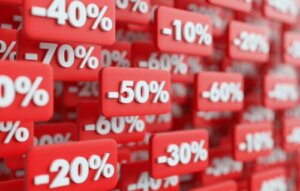Why Do We Feel the Need to Buy More During Sales?


Written and verified by the psychologist Maria Fatima Seppi Vinuales
The summer sales are here with their flashy and colorful posters in the windows, the ads on social networks, and the whirlwind of people coming and going with bags. But why are we such easy prey when it comes to buying more during sales?
With so much information, how do we expect the brain not to be seduced and experience a need to buy? The marketing and sales experts understand how the mind works very well.
We think you may also enjoy reading this article: 10 Tips for Arranging and Organizing Clothes in Your Wardrobe
Why are we tempted to buy more during sales?
When shopping, it’s important to know that the brain works in a compartmentalized way. While there are areas or regions (such as the necortex) that are responsible for thinking more wisely and with a certain logic, there are others linked to the limbic system, which respond to emotions.
Of course, if the customer’s shopping experience is designed from start to finish, it’s difficult to escape. Emotions come to the surface and our most conscious part lowers its defenses.
On the other hand, the brain also works on the basis of reward mechanisms. If there’s something we want very much and we get it at a good price, we feel a sense of well-being and of having achieved something almost unbelievable: having a product at a lower value than usual.
In this case, we must know that the feeling of reward is short-term. That is to say, it lasts for a given moment, but then it quickly goes away.
Along the same lines, sales, when associated with discounts, make it easier to justify consumption. Therefore, the guilt for doing so is weakened.

The influence of context
Many times we want to make purchases because we’re influenced by what’s going on around us. We see a picture of someone wearing a certain sweatshirt and they look happy. We access a video of a person unboxing a certain product and we want to have the same experience.
What motivates us to make a purchase is to match what others are doing. We seek to replicate the situation and take refuge in this kind of guarantee of happiness. Added to this situation is the fact that we want to maintain an image that gives us a sense of belonging.
The brain is also activated by powerful expressions that promise new things, change, and sales. These concepts trigger certain hormones that produce a momentary sense of well-being.
Anything that suggests change works as a natural stimulant, marking beginnings and a sensation of being welcomed. Who doesn’t find it attractive to jump on the bandwagon of starting over?
Like this article? You may also like to read: Tips To Keep Clothes from Accumulating in Your Closet
How to avoid falling into excesses while bargain shopping
First of all, it’s worth noting that this isn’t about criticizing shopping behavior. After all, people like to enjoy small pleasures: a piece of clothing, a good wine, or something similar.
The point is to avoid being puppets of the market by blinding reacting to a stimulus without taking into account other variables. Let’s take a look at some recommendations to rationalize sales purchases.
Avoid looking at advertisements for a long time
Marketing strategies are designed to trigger consumption. In this way, the aim is to move from doubt to “Yes, I’ll buy it”. The more time you spend looking at ads, the more likely you are to be convinced that you need it.
Look only for what you really need
If you want to take advantage of a discount, go to the specific site or sector where you find it. This way, you avoid loitering all over the store and falling into easy shopping.
Allocate a budget when you want to buy on sale
If you want to buy certain products, take advantage and do it with discounts. However, don’t fall into the trap and the excuse that it’s at a very low price and give free rein to your desires. Decide on an amount to spend and stick to that figure.
Think a little further
Consumption for consumption’s sake has consequences that go beyond the economy. It also has an impact on the environment and even many industries receive their profits based on precarious employment.
Therefore, when buying on sale, you can also look for good reasons not to do so. That way, you won’t be part of an irresponsible industry.

Choose your values and don’t let the market do it for you
Although there’s a marketing imperative to buy during sales, it’s necessary to stop and seek meaning. Why do I really want this? Is it necessary to make more purchases? Does buying yet another garment take me away from other objectives, such as saving for a trip with friends?
To be aware, we must know that there are so-called behavioral addictions. They’re related to behaviors and not to substance consumption.
In many cases, they become an obsession, interfere with daily life, and generate withdrawal symptoms. Buying without moderation and permanently could trigger this situation.
Of course, the proposal isn’t to be mortified every time we buy something, but to do it from a place of conscious and responsible consumption. We must know what our values and purposes are and orient ourselves towards them instead of letting ourselves be carried away by the flow of the market.
Apart from personal reasons, there’s also a context that accompanies and sends us all the time the message to buy and buy, promising an impossible reward of satisfaction, self-esteem, and well-being.
All cited sources were thoroughly reviewed by our team to ensure their quality, reliability, currency, and validity. The bibliography of this article was considered reliable and of academic or scientific accuracy.
- RODRÍGUEZ-VILLARINO, RAFAEL, & FERNÁNDEZ-GONZÁLEZ, ÁNGEL , & GONZÁLEZ-LORENZO, MANUEL , & LAMEIRAS-FERNÁNDEZ, MARÍA (2005). Explorando la relación de la adicción a la compra con otros comportamientos excesivos: un estudio piloto. Adicciones, 17(3),231-240.[fecha de Consulta 4 de Agosto de 2022]. ISSN: 0214-4840. Disponible en: https://www.redalyc.org/articulo.oa?id=289122011006
- Fernández, Elena & Garcia, Irene. (2003). La compra por impulso y la adicción al consumo en el País Vasco. Estudios sobre consumo, ISSN 0212-9469, Nº 65, 2003, pags. 53-67. 65.
- García, I. (2007). La compra compulsiva:¿ impulso irresistible o reflejo del sistema de valores personales?. Revista de psicología social, 22(2), 125-136.
This text is provided for informational purposes only and does not replace consultation with a professional. If in doubt, consult your specialist.








